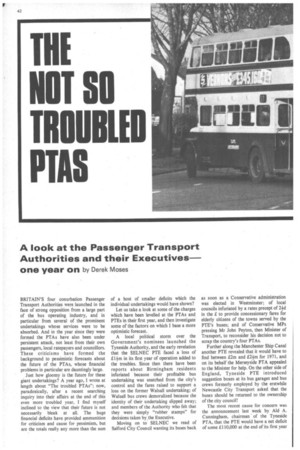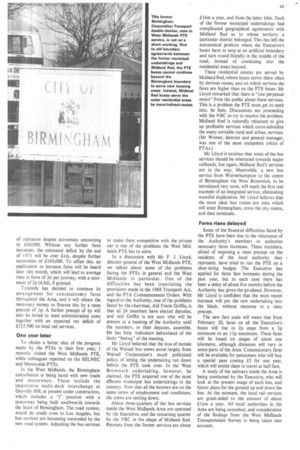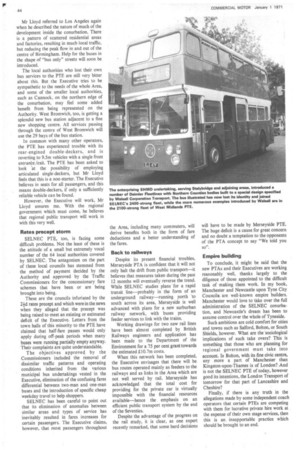THE NOT SO TROUBLED PTAS
Page 44

Page 45

Page 46

If you've noticed an error in this article please click here to report it so we can fix it.
A look at the Passenger Transport
Authorities and their Executives— one year on by Derek Moses
BRITAIN'S four conurbation Passenger Transport Authorities were launched in the face of strong opposition from a large part of the bus operating industry, and in particular from several of the prominent undertakings whose services were to be absorbed. And in the year since they were formed the PTAs have also been under persistent attack, not least from their own passengers, local ratepayers and councillors. These criticisms have formed the background to pessimistic forecasts about the future of the PTAs, whose financial problems in particular are dauntingly large.
Just how gloomy is the future for these giant undertakings? A year ago, I wrote at length about "The troubled PTAs"; now, paradoxically, after a recent searching inquiry into their affairs at the end of this even more troubled year, I find myself inclined to the view that their future is not necessarily bleak at all. The huge financial deficits have provided ammunition for criticism and cause for pessimism, but are the totals really any more than the sum of a host of smaller deficits which the individual undertakings would have shown?
Let us take a look at some of the charges which have been levelled at the PTAs and PTEs in their first year, and then investigate some of the factors on which I base a more optimistic forecast.
A local political storm over the Government's nominees launched the Tyneside Authority, and the early revelation that the SELNEC PTE faced a loss of il+m in its first year of operation added to the troubles. Since then there have been reports about Birmingham residents infuriated because their profitable bus undertaking was snatched from the city's control and the fares raised to support a loss on the former Walsall undertaking; of Walsall bus crews demoralized because the identity of their undertaking slipped away; and members of the Authority who felt that they were simply "rubber stamps" for decisions taken by the Executive.
Moving on to SELNEC we read of Salford City Council wanting its buses back as soon as a Conservative administration was elected in Westminster; of local councils infuriated by a rates precept of 4d in the £ to provide concessionary fares for elderly citizens of the towns served by the PTE's buses; and of Conservative MPs pressing Mr John Peyton, then Minister of Transport, to reconsider his decision not to scrap the country's four PTAs.
Further along the Manchester Ship Canal another PTE revealed that it would have to find between £2m and nim for 1971, and on its behalf the Merseyside PTA appealed to the Minister for help. On the other side of England, Tyneside PTE introduced suggestion boxes at its bus garages and bus crews formerly employed by the erstwhile Newcastle City Transport asked that the buses should be returned to the ownership of the city council!
The most recent cause for concern was the announcement last week by Aid A. Cunningham, chairman of the Tyneside PTA, that the PTE would have a net deficit of some £110,000 at the end of its first year of operation despite economies amounting to £60,000. Without any further fares increases, the estimated deficit by the end of 1971 will be over £.+m, despite further economies of £160,000. To offset this, an application to increase fares will be heard later this month, which will lead to average rises in fares of 3d per journey, with a minimum of 2p (4.8d), if granted.
Tyneside has decided to continue its arrangement for concessionary fares throughout the Area, and it will obtain the necessary money to finance this by a rates precept of lp. A further precept of -fp will also be levied to meet administration costs together with an expected net deficit of £125,000 on local rail services.
One year later
To obtain a better idea of the progress made by the PTEs in their first year, I recently visited the West Midlands PTE, while colleagues reported on the SELNEC and Merseyside PTEs.
In the West Midlands, the Birmingham conurbation is being laced with new roads and motorways. These include the impressive multi-deck interchange at Gravelly Hill, at present under construction, which includes a 'T' junction with a motorway being built southwards towards the heart of Birmingham. The road system, would do credit even to Los Angeles, but bus services are becoming outmoded by the new road system. Adjusting the bus services
to make them competitive with the private car is one of the problems the West Midlands PTE has to solve.
In a discussion with Mr F. J. Lloyd, director-general of the West Midlands PTE, we talked about some of the problems facing the PTEs in general and the West Midlands in particular. One of the difficulties has been translating the provisions made in the 1968 Transport Act, and the PTA Commencement Orders. With regard to the Authority, one of the problems faced by the chairman, Ald Frank Griffin, is that all 24 members have elected deputies, and Aid Griffin is not sure who will be present at a meeting of the Authority until the members, or their deputies, assemble. He has little indication beforehand of the likely "feeling" of the meeting.
Mr Lloyd believed that the loss of morale of the Walsall bus crews arose largely from Walsall Corporation's much publicized policy of letting the undertaking run down before the PTE took over. In the • West Bromwich undertaking, however, he claimed, the PTE acquired one of the most efficient municipal bus undertakings in the country. Now that all the busmen are on the same terms of employment and conditions, the crews are settling down.
About three-quarters of the bus services inside the West Midlands Area are operated by the Executive, and the remaining quarter by the NBC in the shape of Midland Red. Receipts from the former services are about £16m a year, and from the latter £4m. Each of the former municipal undertakings had complicated geographical agreements with Midland Red as to whose territory a particular district belonged. This has left the nonsensical position where the 'Executive's buses have to stop at an artificial boundary and turn round literally in the middle of the road, instead of continuing into the residential areas beyond.
These residential estates are served by Midland Red, whose buses arrive there often by devious routes, and on which services the fares are higher than on the PTE buses. Mr Lloyd remarked that there is "one perpetual moan" from the public about these services. This is a problem the PTE must get its teeth into, he feels. Discussions are proceeding with the NBC to try to resolve the problem. Midland Red is naturally reluctant to give up profitable services which cross-subsidize the many unviable rural and urban, services. (Mr Womer, director and general manager, was one of the most outspoken critics of PTAs.) Mr Lloyd is anxious that some of the bus services should be orientated towards major railheads. but again, Midland Red's services are in the way. Meanwhile, a new bus service from Wolverhampton to the centre of Birmingham via West Bromwich, to be introduced very soon, will mark the first real example of an integrated service, eliminating wasteful duplication. Mr Lloyd believes that the most ideal bus routes are ones which will enter Birmingham, cross the city centre, and then terminate.
Fares rises delayed Some of the financial difficulties faced by the PTE have been due to the reluctance of the Authority's members to authorize necessary fares increases. These members, afraid of imposing a rates precept on the residents of the local authority they represent, have tried to run the PTE on a shoe-string budget. The Executive has applied for three fare increases during the past year, but in each case there has been a delay of about five months before the Authority has given the go-ahead. However, Mr Lloyd is confident that the most recent increase will put the new undertaking into the black, without recourse to a rates precept.
The new fare scale will mean that from February 20, fares on all the 'Executive's buses will rise in 2p steps from a 3p minimum to an 1 lp maximum. These fares will be based on stages of about one kilometre, although distances will vary in some parts of the Area. Concessionary fares will be available for pensioners who will buy a special pass costing £5 for one year, which will entitle them to travel at half fare.
A study of the railways inside the Area is being conducted by the Executive, who will look at the present usage of each line, and future plans for the ground up and down the line. At the moment, the local rail services are grant-aided to the amount of about £14m a year. All local authorities in the Area are being consulted, and consideration of the findings from the West Midlands Transportation Survey is being taken into account. Mr Lloyd referred to Los Angeles again when he described the nature of much of the development inside the conurbation. There is a pattern of scattered residential areas and factories, resulting in much local traffic, but reducing the peak flow in and out of the centre of Birmingham. Help for the buses in the shape of "bus only" streets will soon be introduced.
The local authorities who lost their own bus services to the PTE are still very bitter about this. But the Executive tries to be sympathetic to the needs of the whole Area, and some of the smaller local authorities, such as Cannock, on the northern edge of the conurbation, may feel some added benefit from being represented on the Authority. West Bromwich, too, is getting a splendid new bus station adjacent to a fine new shopping centre. All services passing through the centre of West Bromwich will use the 29 bays of the bus station.
In common with many other operators, the PTE has experienced trouble with its rear-engined double-deckers, and is reverting to 9.5m vehicles with a single front entranbe /exit. The PTE has been asked to look 'at the possibility of employing articulated single-deckers, but Mr Lloyd feels that this is a non-starter. The Executive believes in seats for all passengers, and this means double-deckers, if only a sufficiently reliable vehicle can be found.
However, the Executive will work, Mr Lloyd assures me. With the regional government which must come, he believes that regional public transport will work in with this very well.
Rates precept storm SELNEC PTE, too, is facing some difficult problems. Not the least of these is the attitude of a small but extremely vocal number of the 64 local authorities covered by SELNEC. The antagonism on the part of these local councils has stemmed from the method of payment decided by the Authority and approved by the Traffic Commissioners for the concessionary fare schemes that have been or are being brought into being.
These are the councils infuriated by the 2id rates precept and which were in the news when they alleged that the precept was being raised to meet an existing or estimated deficit of the Executive. Letters from the town halls of this minority to the PTE have claimed that half-fare passes would only apply during off-peak periods when many buses were running partially empty anyway. Their complaints are quite understandable.
The objectives approved by the Commissioners included the removal of dissimilar traffic patterns and operating conditions inherited from the various municipal bus undertakings vested in the Executive, elimination of the confusing fares differential between two-man and one-man buses and the introduction of specific cheap weekday travel to help. shoppers.
SELNEC has been careful to point out that its elimination of anomalies between similar areas and types of service has inevitably resulted in fares increases for certain passengers. The Executive claims, however, that most passengers throughout the Area, including many commuters, will derive benefits both in the form of fare deductions and a better understanding of the fares.
Back to railways
Despite its present financial troubles, Merseyside PTA is confident that it will not only halt the drift from public transport—it believes that measures taken during the past 12 months will eventually reverse the trend. While SELNEC studies plans for a rapid transit line—probably in the form of an underground railway—running north -to south across its area, Merseyside is well advanced with plans for a new surburban railway network, with buses providing feeder services to link with the trains.
Working drawings for two new rail lines have been almost completed by British Railways engineers and application has been made to the Department of the Environment for a 75 per cent grant towards the estimated £10.7m costs.
When this network has been completed, the Executive envisages that there will be bus routes operated mainly as feeders to the railways and as links in the Area which are not well served by rail. Merseyside has acknowledged that the total cost for providing for the private car is virtually impossible with the financial resources available—hence the emphasis on an efficient public transport system by the end of the Seventies.
Despite the advantage of the progress on the rail study, it is clear, as one expert recently remarked, that some hard decisions will have to be made by Merseyside PTE. The huge deficit is a cause for great concern and no doubt a temptation to the opponents of the PTA concept to say "We told you so".
Empire building To conclude, it might be said that the new PTAs and their Executives are working reasonably well, thanks largely to the diligence of those appointed to the difficult task of making them work. In my book, Manchester and Newcastle upon Tyne City Councils are well-known empire builders. Manchester would love to take over the full administration of the SELNEC conurbation, and Newcastle's dream has been to assume control over the whole of Tyneside.
Such ambitions are cold comfort for cities and towns such as Salford, Bolton, or South Shields, however. What are the 'sociological implications of such take covers? This is something that those who are planning for regional government must take into account. Is Bolton, with its fine civic centre, any more a part of Manchester than Kingston-upon-Thames is of London? And is not the SELNEC PTE of today, however good its intentions, the London Transport of tomorrow for that part of Lancashire and Cheshire?
Finally, if there is any truth in the allegations made by some independent coach operators that certain PTEs are competing with them for lucrative private hire work at the expense of their own stage services, then this is an insupportable practice which should be brought to an end.




















































































